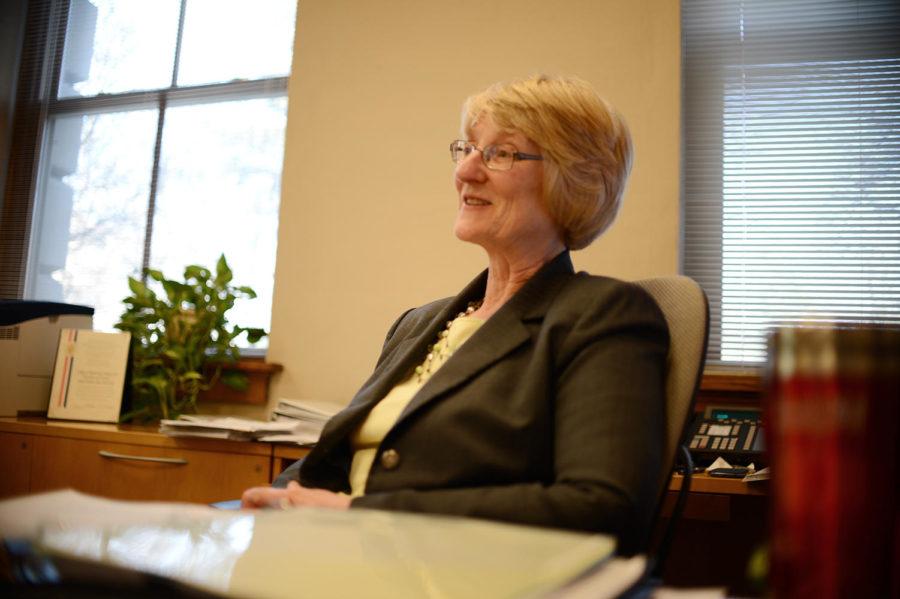Rajala shares goals, visions as new college of engineering dean
Photo: Huiling Wu/Iowa State Daily
Dean of Engineering Sarah Rajala talks to the Iowa State Daily on Wednesday, April 24, 2013, at Marston Hall.
May 7, 2013
After a month on the job as the new dean of the college of engineering, Sarah Rajala still finds herself with a packed schedule on campus while also adjusting to life in Ames.
Since her start on April 1, 2013, “the first few weeks have been very busy. There are lots of people to meet, new procedures to learn. When moving from one university to the other, there’s some things the same, some different,” Rajala said.
One thing unique to Iowa State is Veishea, which Rajala took part in for the first time this year.
“Veishea week was great. We had our Marston club dinner; that’s an annual event the college holds to honor some of our alums. I also walked with the freshman students [in the parade]. It’s always great to meet the students,” Rajala said.
Now, with a lot of the formalities that come with assuming a new title behind her, Rajala looks forward to use the duration of the semester, as well as the summer, to evaluate the college’s standing.
“Over the summer, I hope to spend a little more time thinking about what our highest priorities are, how we should be spending our time and attention,” Rajala said.
Given the college of engineering’s recent enrollment growth, which has made it Iowa State’s largest undergraduate college, accommodations to match this growth are necessary.
“We’ve had a lot of enrollment growth, and we want to ensure that students get the highest quality of education. So the question is ‘How do we ensure that?’ We know we need more faculty, so we have to work on strategies for hiring more faculty,” Rajala said.
A related goal, which would serve to benefit increased numbers in students and faculty, involves increasing outside funding coming into the college.
“Bringing in resources that are outside of the normal state resources or tuition resources are extremely important these days,” Rajala mentioned.
In terms of where funds will be allotted, providing more opportunities for students is of high importance.
“Whether we see it renovating space, providing scholarships or providing stipends for graduate students, all of that is about getting a better education environment for the students,” said Mufit Akinc, interim dean of the college prior to Rajala’s arrival.
A specific example where funds will be used in renovation involves a recently approved renovation of Marston Hall.
“It’s a $20 million project. We have about $12 million lined up between university resources and some gift money, but we have $8 million we need to work on raising, so that will be a major task,” Rajala said.
The renovation will replace Marston Hall’s current heating, air conditioning and elevator systems, as well as alter the building’s layout to allow for more efficient use of space.
The first floor will be devoted to prospective and current students, with a new welcome center for visitors. New classrooms, as well as new meeting areas for student organizations, are also planned.
The second floor will be largely reserved for faculty offices, including the dean’s office.
“We certainly want to maintain the architectural history and features of the building but there will be some realignment of space so it’s used much more efficiently,” Rajala said.
The renovations to Marston Hall will also seek to be LEED compliant, a recognition deemed by the U.S. Green Building Council for buildings that meet specified environmental guidelines.
“We want to make sure we’re environmentally good stewards, so we’re striving for Gold LEED status,” Rajala said.
Beyond issues of funding and renovations, Rajala also has her sights on promoting diversity within the college.
“At the faculty level, we are all going to be as proactive as we can in terms of searching for certainly the very best quality in terms of the faculty, but also a very diverse faculty,” Rajala said.
From a student perspective, a multi-leveled approach will be sought.
“We’ll look at ways in which we can build partnerships with high schools that may have more diverse populations of students. We’ll certainly look at our culture within the college to make sure we’re as welcoming as we can be and should be to anyone that comes to the university,” Rajala said.
Rajala also mentioned that student organizations promoting diversity will be provided for.
One student organization in particular is the Society of Hispanic Professional Engineers.
“We’re working with them to hold a regional convention here, that will help raise awareness and illustrate the importance [of diversity],” Rajala said.
Regardless of circumstance, Rajala plans to draw on her breadth of past experiences, which has featured several teaching and administrative positions, to guide her through any challenges that may arise during her tenure as dean.
“There will be new challenges and opportunities, but you always look back at how you solved or addressed a particular issue in the past and how that might influence how you approach it in the future,” Rajala said.

















